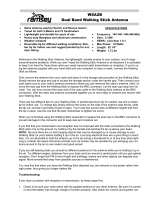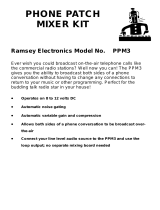Page is loading ...

SPECIFICATIONS
• Frequency: 144—148 MHz
• Gain: 2.1dBi
• VSWR: Less than 1.5:1
• Max Power: 10 Watts
• Length: 57 21/4”
• Weight: 1.7 Lbs
WSA2M
Walking Stick Antenna
Welcome to the Walking Stick Antenna, the lightweight, durable answer to your outdoor, out-of range
transmit/receive problems. While you won’t need the Walking Stick Antenna in all situations it is advisable
to keep it on hand for those times when you need improved radio transmission or reception. If you’re us-
ing the antenna supplied with your hand-held and your reception is noisy or weak, connect the Walking
Stick as follows.
First, remove the antenna from your radio and place it in the storage area provided on the Walking Stick.
Simply remove the gray end cap to access the storage section under the handle grip. Then connect your
coax patch cord to your radio’s antenna connector where you just removed the radio’s antenna. Next, re-
move the dust cap from the Walking Stick to expose the BNC connector. Let the dust cap hang from its
chain. You can now connect the loose end of the coax cable to the Walking Stick antenna at the BNC
connection. With the radio and antenna connected together you’re now ready to transmit and receive with
your Walking Stick.
There are two different tips for your Walking Stick: A pointed aluminum tip for outdoor use and a rubber
tip for indoor use. To change tips simply remove the screw on the side of the antenna near the tip, slide
the tip out, reverse it and slide it back in place. You’ll note two screw holes at different heights that hold
the tip in place. Use the one that fits best. Remember to tighten the screw.
When you’re finished using the Walking Stick remember to replace the dust cap on the BNC connector to
prevent damage to the connector and to keep dust and moisture out.
If you find that your transmission and reception has not improved with the radio connected to the Walking
Stick when it is on the ground, try holding it by the handle and pointing the tip up above your head.
NOTE: Be sure there are no low hanging objects that may be damaged by or cause damage to your
Walking Stick (or you!) before holding it up in the air. Low lying electrical lines are a good thing to avoid!
Also, it is not advisable to hold the antenna up in the air during a thunderstorm or at any time when light-
ning is a threat. Be aware that some animals such as horses may be spooked by you swinging your an-
tenna around in the air so use caution and good sense!
If you are still hearing static you should try different positions for the antenna while you’re holding it up in
the air. Try different angles, distances from your body and turn around a central point until you get optimal
reception. Don’t forget that FM is line-of-sight and buildings, towers and other objects can degrade your
signal. Move several feet away from possible sources of interference.
You may find that when you have the Walking Stick attached you can transmit on low power rather than
high power, thus giving you longer battery life.
Troubleshooting:
If you have a problem with reception or transmission, try these steps first.
1. Check to be sure your radio works with its supplied antenna or any other antenna. Be sure it is turned
on and the battery has enough charge to function properly. Also check the volume and squelch con-
• Same antenna used by Search and Rescue teams!
• Tuned for the Two Meter Band: Full half wave an-
tenna!
• Lightweight and durable for years of use
• Heavy duty fiberglass and aluminum construction
• Weather resistant
• Reversible tip for different walking conditions: Rub-
ber tip for indoor use and rugged pointed tip for out-
door hiking

trol and make sure you’re on the correct channel. Refer to your owners manual for proper use of
your radio.
2. Check your BNC’s for dirt or other debris that could be keeping them from making good contact.
Heavy use can wear out BNC connectors so check the center on the connector.
3. Check your coax cable connection. Be sure you’re connected to the antenna jack on your radio and
the other end of the cable is properly connected to the Walking Stick. Look at the center conductor
to be sure it can make contact and is not worn or broken. If everything looks correct, be sure your
cable is good by trying it on another radio or connecting a known good cable. BNC cables can wear
out. RG-58 A/U cable is recommended.
4. Remember that the station you’re trying to contact may be more powerful than you are. You may be
able to hear them when they can’t hear you at all. Try a different location; higher ground can help.
Precautions:
• Don’t transmit more than 10 watts into your Walking Stick.
• Don’t lean on your BNC connector.
• Don’t use your Walking Stick as a tool for prying, lifting, hammering, etc.
• Don’t submerge the antenna.
• Don’t use your Walking Stick when lightning is a threat.
• Don’t leave the antenna in direct sunlight for long periods.
• Don’t use the antenna on any frequencies other than Two Meters.
• Don’t drag the Walking Stick by the coax cable.
• Don’t use any other than 50 ohm coax.
• Don’t use acetone or other solvents to clean the Walking Stick antenna.
And lastly Do replace the dust cap on the BNC connector when not in use.
Your Walking Stick can be cleaned best with soap and water and can be recoated with high tech car
wax, epoxy or polyurethane if needed. (Always clean the antenna before recoating!) Replace the dust
cap as soon as possible if it is lost. With a little maintenance your Walking Stick antenna will provide you
with years of good service.
WARRANTY INFORMATION
RAMSEY ELECTRONICS WARRANTY APPLIES TO ORIGINAL PURCHASERS ONLY
ALL FACTORY ASSEMBLED PRODUCTS ARE WARRANTIED TO BE FREE FROM DEFECTS IN
PARTS OR WORKMANSHIP FOR A PERIOD OF ONE (1) YEAR FROM THE DATE OF ORIGINAL
PURCHASE. PROOF OF PURCHASE MUST ACCOMPANY THE UNIT. THIS WARRANTY APPLIES
TO UNITS THAT HAVE NOT BEEN MODIFIED, MISUSED, ABUSED, OR REPAIRED BY
UNAUTHORIZED PERSONNEL.
PLEASE INCLUDE A DESCRIPTION OF THE PROBLEM AND A LEGIBLE RETURN ADDRESS.
RETURN SHIPPING AND INSURANCE REMITTANCE OF $3.00 IS REQUIRED. ENCLOSE ALL
CORRESPONDENCE WITH THE UNIT.
TIME INVOLVED FOR REPAIR DEPENDS ON THE PRODUCT. IT TYPICALLY RUNS ONE TO TWO
WEEKS AFTER FACTORY RECEIPT.
RAMSEY ELECTRONICS, INC. RESERVES THE RIGHT TO REFUSE REPAIR ON ANY ITEM.
Any problems or questions? Call Ramsey at (585) 924-4560.
RAMSEY ELECTRONICS, INC.
590 Fishers Station Drive • Victor, NY 14564 • (585) 924-4560 • (585) 924-4886 Fax
http://www.ramseykits.com
/











